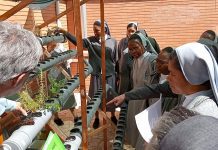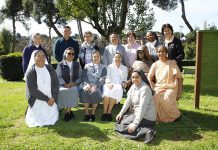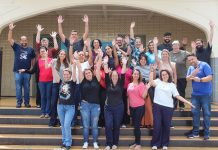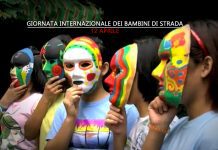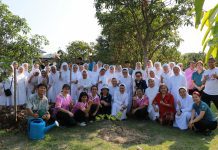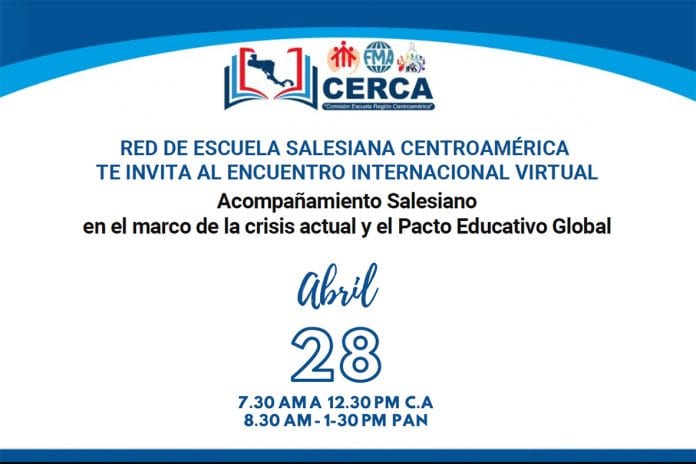Central America. On 28 April 2021, the 23rd meeting of the Salesian School Network of the Central American Region (CERCA) took place on the theme “Salesian accompaniment in the context of the current crisis and the Global Pact for Education”.
The Central American Region Salesian School Network (CERCA) brings together about 60 educational institutions of the Daughters of Mary Help of Christians, the Salesians of Don Bosco, the Daughters of the Divine Savior, and shares the educational mission with other Groups of the Salesian Family, including Salesian Cooperators , Past Pupils, and Damas Salesianas.
The meeting had the objective of studying in-depth the themes of education and accompaniment and sharing educational experiences as Salesian Schools network of America, to welcome the challenge of the Global Pact for Education, through Salesian accompaniment as a concrete response to the Covid-19 pandemic.
About 600 participants were online, members of the Provincial Councils, Directors of Salesian Educational Institutions, School and Pastoral Coordinators, members of the Salesian Family Groups, parents, representatives of the Salesian School of Italy, United States, Mexico, Bolivia, Peru, Haiti, and Chile.
Present at the meeting were Sr. Runita Borja, Councilor for Youth Ministry, Sr. Ivone Goulart, collaborator of the YM Sector and Referent of the Salesian School for America of the FMA, Sr. Altagrace Mathías, referent of the Salesian School America (ESA) for the Interprovincial Conference of Mexico, Antilles, and Central America (CIMAC), Fr. Claudio Cartés, referent of the Department for Youth Ministry, Salesian School for America Sector, and Fr. Carlos Montoya, ESA Referent for the Mesoamerica Region.
Sr. Runita Borja stressed the importance of accompaniment: “In our educational institutions we see the need for accompaniment: individual, for groups, and for families. For this reason, it is important in the perspective of the Global Pact for Education, to unite the forces of religious men and women, lay educators, priests, non-teaching staff, young leaders, members of the Salesian Family, people, and organizations involved in education, so that we can reach more children, adolescents, young people, and families. Joining forces in favor of education means wagering on accompaniment”.
The theme was developed by Fr. Alejandro Rodríguez Rodríguez, SDB, educator and researcher at the Salesian Studies Center in Berkeley, California, and by Sr. Ana Victoria Ulate, collaborator of the Youth Ministry Sector, who oriented the reflection on “Salesian accompaniment for the re-flowering of the human being” for a “Response of Quality and Hope of the Salesian School”.
Starting from the charismatic identity, to respond to the mission entrusted by God, which is expressed in Don Bosco’s Da mihi animas cetera tolle, and in the call to holiness through the style and spirituality of the Preventive System, is the way to follow. The ‘culture of accompaniment’ proposes the centrality of the person and his/her humanization in an integral and transcendent perspective, overcoming isolated actions, fragmentation, and a throwaway culture that derive from the current anthropological, cultural, and social crisis, aggravated by the pandemic.
Accompaniment is proposed through three generative values of a united and evangelical humanity, which weave networks and open up paths of life: “we are”, “we share” and “we take care”.
“Being present”, “sharing life” and “mutual care” are expressed in the words of Pope Francis, in the language of hands, mind, and heart. It is a Salesian language centered on the person, which comes from the educational experience of Don Bosco and Mother Mazzarello, favors participation through listening and involvement, and focuses on the weakest and most marginalized.
The challenge of the Salesian School is to respond to current educational needs, formation in self-care and the care of others, online and face-to-face learning, personalized, emotional learning, digital citizenship, the recovery of art and of the game, the experience of the oratory, even virtual. The ‘virtual oratory’ is not a place, but an experience that refers to the meaning of the family, the home, the encounter with the transcendent and with the other through the playful experience of games, music, and art.


